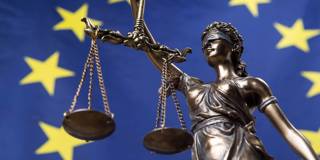Although European Union member states tend to comply with rulings by the European Court of Justice, this is only a partial solution to curtailing threats to the rule of law. Fortunately, the EU has several other tools with which to uphold this fundamental pillar of democratic governance.
HELSINKI – The Supreme Court of the United Kingdom’s recent ruling that Prime Minister Boris Johnson acted unlawfully in seeking to suspend (or “prorogue”) the UK Parliament for five weeks to avoid debate of his plans for a “no-deal” Brexit underscores the centrality of the rule of law to democratic governance. But while the rule of law prevails in the UK, concerns are arising elsewhere in the European Union. For the EU, protecting the rule of law is an obligation – one that its leaders must be adamant in upholding.
In his book The Origins of Political Order, the political scientist Francis Fukuyama argued that the rule of law is the most difficult pillar for a successful modern society to construct. Organizing government administration and staging elections to a legislative body are relatively easy, and only a small number of failed states have no functioning public administration or legislature. But in far more countries, the absence of the rule of law is the primary source of instability and political decay.
For the EU, the rule of law is of central importance, because the EU is not simply a joint economic undertaking (although, as the economist Hernando de Soto has emphasized, the rule of law is also a prerequisite for a developed market economy). The EU’s raison d’être, like that of its predecessors, is to guarantee peace between European countries and to safeguard human rights within its member states. And the bloc is founded on common values enshrined in its treaties.

HELSINKI – The Supreme Court of the United Kingdom’s recent ruling that Prime Minister Boris Johnson acted unlawfully in seeking to suspend (or “prorogue”) the UK Parliament for five weeks to avoid debate of his plans for a “no-deal” Brexit underscores the centrality of the rule of law to democratic governance. But while the rule of law prevails in the UK, concerns are arising elsewhere in the European Union. For the EU, protecting the rule of law is an obligation – one that its leaders must be adamant in upholding.
In his book The Origins of Political Order, the political scientist Francis Fukuyama argued that the rule of law is the most difficult pillar for a successful modern society to construct. Organizing government administration and staging elections to a legislative body are relatively easy, and only a small number of failed states have no functioning public administration or legislature. But in far more countries, the absence of the rule of law is the primary source of instability and political decay.
For the EU, the rule of law is of central importance, because the EU is not simply a joint economic undertaking (although, as the economist Hernando de Soto has emphasized, the rule of law is also a prerequisite for a developed market economy). The EU’s raison d’être, like that of its predecessors, is to guarantee peace between European countries and to safeguard human rights within its member states. And the bloc is founded on common values enshrined in its treaties.